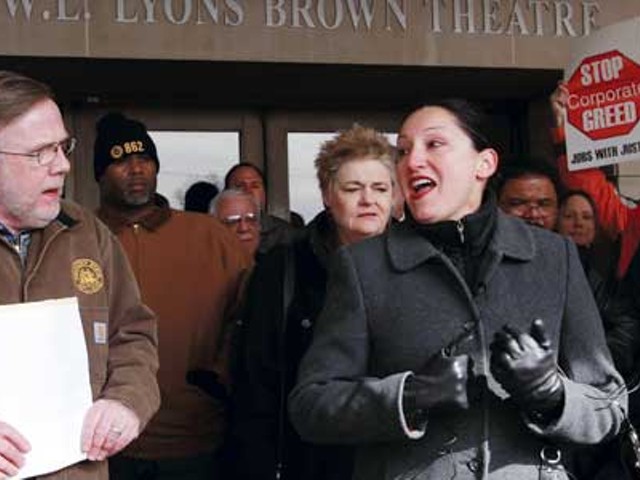“Jefferson County/Metro Louisville has been deemed one of the most poorly planned cities in the nation, in terms of suburban sprawl and dumb growth,” state Rep. Jim Wayne told the House Local Government Committee on Jan. 11.
He didn’t see how that would change with the passage of the developer-friendly bill under consideration. And he didn’t say what sources have been telling LEO since last October: Private developers are exerting unprecedented influence in Metro Planning — the agency charged with protecting the public interest — and that, as a result, smart growth seems more elusive than ever.
But the veteran lawmaker, whose constituents were ravaged under the airport expansion, spoke from experience: “I’ve represented people for 22 years who’ve had conflicts with businesses because businesses continue to basically move into their neighborhoods and want their will to dominate the neighborhoods’ will.”
The measure, House Bill 123, permits the City of Jeffersontown to create a board of zoning adjustment apart from Louisville Metro’s Board of Zoning Appeals in an effort to speed the process of considering zoning waivers and variances requested by businesses, developers or their attorneys.
The process is slow, Wayne said, because citizens, who don’t employ “big, hired-gun attorneys who specialize in this stuff,” need time to “get their arguments lined up and organize their case against the business.”
Jeffersontown Mayor Bill Dieruf assured Wayne that citizen rights would not be infringed upon and a separate docket would alleviate the backlog of cases, allowing new ones to be heard sooner. Wayne had other concerns. “You say you would be in compliance with Cornerstone 2020 … but there’s nothing in the statute that says — that guarantees — that,” he said.
The county government approved Cornerstone 2020, nine years in the making, in 2002. It gave government planners unprecedented authority to regulate the design and appearance of all proposed development.
Understandably, Wayne was protective of the landmark document. The power it granted planners came under attack a year ago when attorney Bill Bardenwerper, a big contributor to Mayor Greg Fischer and the biggest of the “hired guns” who represent developers and homebuilders, issued a report on behalf of Fischer’s transition team. It accused planners of an anti-development bias and said they should “be told what to do and what not to do, and most can even be convinced to behave and thus handle their jobs differently.”
It suggested wholesale changes in the Department of Codes and Regulations and the creation of a new department widely viewed as an advocacy group for developers.
Amid a firestorm of controversy, Fischer last February appointed a group — including Bardenwerper and led by Metro Codes and Regulations Director Jim Mims — to conduct a comprehensive performance audit of Planning and Design Services.
The review, concluded in October, recommended the hiring of a permanent director. In November, Fischer appointed Phil Bills, 66, to that position. Bills is past president of Birch, Trautwein & Mims Engineering, a landscape design firm that does work for real estate developers. His boss, Jim Mims, was the Mims of the aforementioned firm.
Foxes, meet henhouse.
The former partnership of Bills and Mims in lucrative service to the development community doesn’t bode well for the future of city planning. What’s been happening at Metro planning is troubling. Staff cuts and transfers bring highly trained, professional planners closer to the automated role Bardenwerper envisioned in a July 11 memo to Mims, in which he suggested their role “is not to interpret or offer opinions on ANYTHING but to ministerially administer Codes and Regulations …”
Bardenwerper claims that planners need an attitude adjustment. Pot, meet kettle. His manifestos amount to a full assault on the American Planning Association’s code of ethics, which emphasizes “our primary obligation to the public interest,” “independent professional judgment” and “concern for the rights of others” including “those who lack formal organization or influence.”
Supposedly cheeky planners are not the problem. Bardenwerper’s issue is clearly with a utopian code of ethics that condemns actual and apparent conflicts of interest and complicates his conspiracy to politicize, if not privatize, Metro Planning.
A year ago Mayor Fischer said, “I want our Planning and Design department to be the best in the country.”
Good luck with that.





